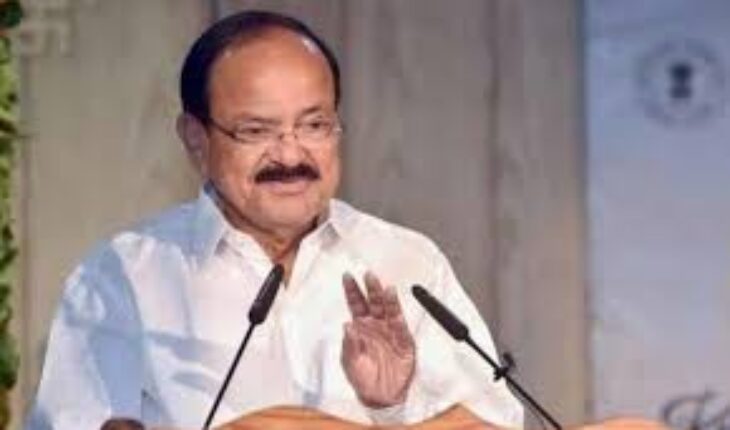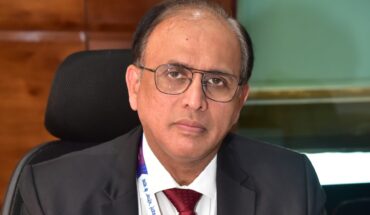Vice President, M Venkaiah Naidu today called upon the people, particularly the youth, to adopt healthy lifestyle and avoid sedentary living and junk food in view of the growing incidence of non-communicable diseases in the country.
Addressing the scientists of Centre for DNA Fingerprinting and Diagnostics after visiting its facilities in Hyderabad, he said that a few years ago, WHO data has attributed 61 per cent of all deaths in India to NCDs like heart disorders, cancer and diabetes.
Naidu called for arresting this trend by mounting a massive national campaign on the importance of adopting healthy lifestyle and food habits. In this context, he urged the scientists to create awareness among the people on making healthy choices.
Calling for collective efforts to promote awareness among the people, particularly school and college students, on the negative impact of sedentary lifestyles and unhealthy dietary habits, the Vice President stressed the need to promote organic farming, revisit our traditional food habits and promote the consumption of protein-rich food for better health outcomes. Cautioning against the fad for instant food, he quipped “instant food means constant disease”.
Referring to the burden of genetic diseases, the Vice President asked the scientists to develop simpler and cost-effective methods for diagnosis of various genetic diseases to help in better patient management. He lauded CDFD for identifying novel genetic mutations for more than 10 disorders in India, including the identification of 4 new genes, which would be helpful in genetic counseling and management of diseases.
During the visit, the Vice President also inaugurated ‘Pediatric Rare Genetic Disorders’ laboratory at CDFD.
Referring to the increased incidence of non-communicable diseases in India, he said that rare genetic disorders form a major group of NCDs.
Observing that an estimated 350 million people were suffering from “Rare diseases” worldwide and about 70 million (1 in 20) in India, Shri Naidu pointed to the cascading effect of the burden of these disorders on the economy and social structure of the society since most of them are untreatable.
Appreciating the Department of Biotechnology (DBT) for promoting genome-based public health research and for asking CDFD to take-up a major research program on “Pediatric Rare Genetic Disorders”, he said the programme would contribute positively towards the Government of India’s Sustainable Development Goals regarding human health and mitigate the societal burden of genetic diseases.
Noting that CDFD has provided services for genetic testing and counseling of patients with genetic diseases to more than 60,000 families since its inception, Naidu lauded the institution for establishing nationwide collaborations with several clinical centres for evaluation of patients with unexplained genetic disorders. He asked CDFD to create awareness among the people through media on the services it was offering on genetic diseases.
Referring to the unprecedented challenges faced by humankind in the wake of COVID-19 pandemic, he commended CDFD’s Corona Warriors for providing accurate diagnosis of COVID-19 infection. “I am told that CDFD has undertaken the testing of more than 40,000 samples in the past 10 months”, he said.
Appreciating CDFD’s contribution towards understanding the mutation spectrum of Corona virus in the Indian population, he said “such efforts go a long way in ensuring our readiness to tackle any variants of the virus”.
Pointing out the problem of increased crime rate in the world, he lauded CDFD for providing state of the art DNA fingerprinting service to courts, National Investigating Agency (NIA) and CBI for ensuring correct judgment in criminal cases, and in providing relief to the families of disaster victims.
Lauding the contributions made by the CDFD scientists and scholars, Shri Naidu urged them to ensure that the outcomes of the research benefit the common man and improve the quality of their lives. “The ultimate aim of science must be to make people’s lives happier”, he added.
Telangana Home Minister, Mohd. Mahmood Ali, CDFD Director, Dr. K. Thangaraj, senior officials from the Department of Biotechnology, scientists, research scholars and staff were present on the occasion,
Following is the full test of the speech –
“I am extremely delighted to visit the Centre for DNA Fingerprinting and Diagnostics (CDFD), one of India’s premier scientific institutions of the Department of Biotechnology (DBT), and to interact with all of you.
I am aware that the CDFD is a unique institute, created with the goal of “Innovating to benefit society” by providing services in the area of DNA fingerprinting and diagnosis of genetic disorders, and to conduct high quality basic research. The uniqueness stems from the ‘hybrid model’–the two arms of ‘services’ and ‘research’ benefiting from each other.
I am aware that CDFD’s DNA fingerprinting technique has helped the investigating agencies and judiciary in solving several major cases. Similarly, CDFD has been the referral centre for genetic diagnostics.
I am very happy to note that the CDFD has just entered into 25 years of its service to the nation. I am delighted to visit the Institute when it is celebrating its Silver Jubilee.
I would like to appreciate and congratulate all of you for serving the nation for the last 25 years and encourage you to continue working towards developing newer technologies for better, simpler and cost-effective methods for diagnosis of various genetic diseases. This would help in better patient management.
As you all are aware, India has made substantial progress in the field of science and technology during the past few decades. It has been our continuous endeavor to provide succor to the millions suffering from various genetic disorders.






